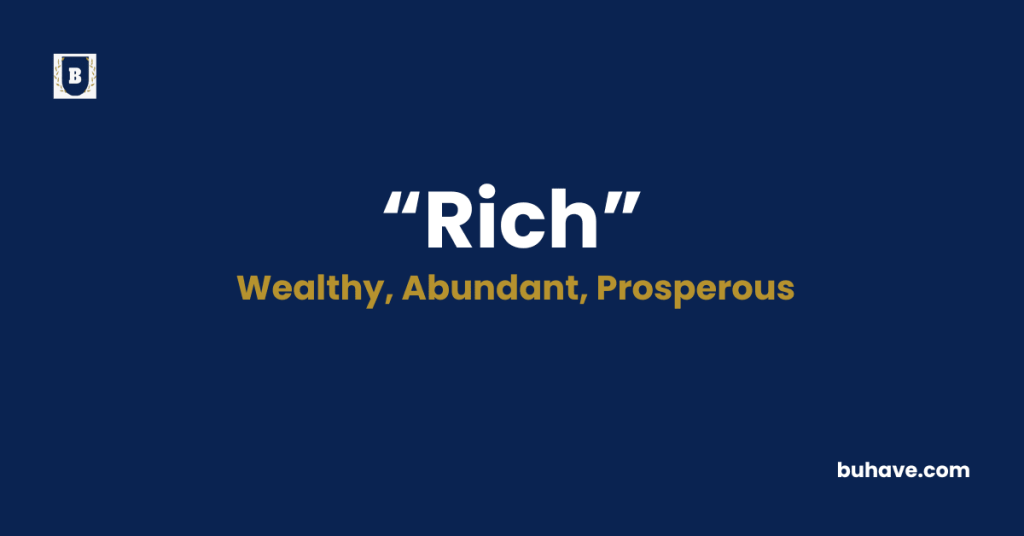The word ‘Rich’ (Adjective) describes having a large amount of something valuable most often wealth, but it can also mean richness in flavor, color, experience, or quality. In everyday human language. in this guide, you’ll learn the full definition, synonyms, antonyms, etymology, and real-life examples of how to use ‘Rich’ correctly in sentences.
Rich Explained in Depth
A complete and detailed guide to the words including Rich meanings, definitions, examples, etymology, synonyms, and antonyms.
Meanings of Rich
Rich is a versatile adjective that goes far beyond just describing material wealth. At its core, it signifies an abundance whether that’s of money, resources, taste, quality, or even experiences. When someone says a person is rich, they often mean financially well-off. But when they refer to a “rich flavor,” they’re talking about deep, full taste. A “rich history” implies something full of events, meaning, and depth.
In financial contexts, being rich means having a large amount of money, property, or assets. But the richness of a cake, a color, a voice, or a tradition adds different shades of meaning.
Definition
Rich refers to having a large amount of something valuable most often wealth, but it can also mean richness in flavor, color, experience, or quality. In everyday human language, when we say someone is rich, we usually mean they have a lot of money or possessions. However, the word rich goes beyond just finances
In general, it refers to a state of plentifulness or depth whether it’s financial prosperity, sensory experience, or emotional fulfillment.
Etymology
The word “rich” has ancient roots stretching back through Germanic and Latin languages. It comes from the Old English word rīce, which meant “powerful, mighty, or wealthy.” This, in turn, was borrowed from Proto-Germanic rīkijaz, meaning “ruler” or “kingly,” which connects to the idea of having influence or abundance. The Proto-Germanic term is also the source of the modern German word reich (meaning “empire” or “wealthy”).
Going back even further, “rich” shares origins with the Proto-Indo-European root reg-, meaning “to move in a straight line,” “to direct,” or “to rule.” This root also gives rise to words like “regal” and “reign.” These origins suggest that being rich was historically associated with power, leadership, and control over resources—not just material possessions.
By the Middle Ages, the word had evolved in English to mean both financial wealth and richness in other qualities—like fertile soil or flavorful food. This broadening of meaning has remained with us ever since, making “rich” a word that can express both physical abundance and experiential depth.
Example Sentences
- He became rich after launching a successful tech startup.
- The soup was rich and flavorful, with layers of herbs and spices.
- She has a rich knowledge of ancient cultures and languages.
- The sunset painted the sky in rich shades of orange and pink.
- His voice was deep and rich, captivating everyone in the room.
Rich Synonyms
- Wealthy
- Affluent
- Opulent
- Lavish
- Flavorful
- Vibrant
- Intense
- Abundant
- Deep
- Full-bodied
Rich Antonyms
- Poor
- Destitute
- Bland
- Thin
- Dull
- Empty
- Weak
- Sparse
- Impoverished
- Meager
FAQs about Rich
1. Does “rich” only refer to money?
No, while “rich” commonly refers to wealth, it can also describe other forms of abundance, like flavor, color, experience, or culture. For example, a “rich chocolate cake” refers to its taste and texture—not its price.
2. Can “rich” describe people emotionally or spiritually?
Yes. Someone might be described as “rich in spirit,” “rich in kindness,” or “living a rich life,” meaning they have emotional depth, strong values, or meaningful experiences, regardless of their financial status.
3. Is “rich” always positive?
Usually, yes—but in some contexts, it can imply excess or overindulgence. For example, a dessert that’s “too rich” might feel overwhelming or overly heavy in flavor.
4. How is “rich” used in literature or storytelling?
In literature, “rich” can describe vivid imagery, strong emotional content, or luxurious settings. A “rich narrative” usually means the story is layered, complex, and engaging.
5. What’s the difference between “rich” and “wealthy”?
Both refer to financial abundance, but “rich” is often more versatile and emotionally expressive. “Wealthy” is more clinical or factual, while “rich” can be used metaphorically in many ways.

















